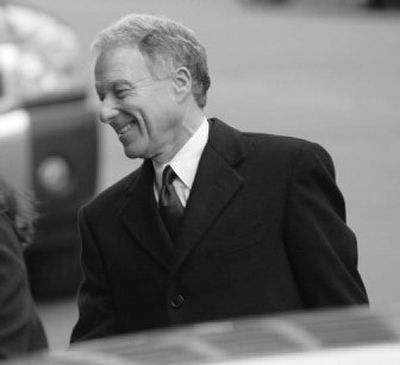Defense says Libby was scapegoat

WASHINGTON – Lewis “Scooter” Libby was “put through the meat grinder” by the White House shortly after the Iraq war began, scapegoated to conceal that Karl Rove, the president’s top political adviser, helped disclose an undercover CIA officer’s identity, a defense attorney contended Tuesday as Libby’s perjury trial began.
The lawyer, Theodore Wells, and Special Counsel Patrick Fitzgerald agreed that Vice President Cheney ordered Libby, then his chief of staff, to contact reporters early in the summer of 2003 in an effort to rebut criticism that the administration had selectively used intelligence to justify the invasion of Iraq.
According to Wells, the confidential conversations Libby had with several well-known journalists were not intended to spread the identity of Valerie Plame, the covert CIA officer. Instead, Libby’s lawyer said, he was acting at Cheney’s instructions to respond to allegations that the vice president withheld information that would have raised doubts about whether Iraq was trying to develop weapons of mass destruction.
The dramatic opening statements in the first hours of the celebrated trial laid bare fissures deep inside the White House. They came as the prosecution and defense provided the jury crackling portrayals of their opposing theories of the case.
The two sides’ accounts exposed jurors to handwritten notes by Cheney, the internal culture of major newsrooms, a tape recording of Libby speaking to grand jurors and a White House under fire as its justification for war was beginning to unravel.
Libby, 56, is accused of five felony charges stemming from a federal investigation into the leak of Plame’s identity to the media. Libby is not charged with the leak itself, nor is anyone else. He faces two counts of making false statements to FBI agents, two counts of perjuring himself before a grand jury and one count of obstructing the investigation, and has pleaded not guilty to all charges.
“How could we reach a point where the chief of staff for the vice president was repeatedly lying to federal investigators?” Fitzgerald asked jurors. “That’s what this case is all about.”
During an hour-long opening statement that started the trial, the prosecutor painted for the jury what he called “a firestorm” inside the White House on the final day of the July 4, 2003, holiday weekend, when an op-ed piece by Plame’s husband, former Ambassador Joseph Wilson, attacked the administration. Wilson, who had been sent to Niger by the CIA to determine whether Iraq was seeking uranium for its nuclear weapons program, said the president and his aides “may have twisted the intelligence” concerning whether Iraq was seeking weapons of mass destruction.
Libby told investigators that he was surprised to learn from NBC’s Tim Russert in July 2003 that Wilson was married to Plame. But Fitzgerald contended that Libby, at Cheney’s direction, had been asking people about Wilson for weeks.
He said Libby’s claim to a grand jury that he simply had forgotten what he knew was implausible because he had passed on Plame’s name to reporters and then-White House press secretary Ari Fleischer before he ever spoke with Russert.
“You can’t learn something startling on Thursday that you’re giving out Monday and Tuesday of the same week,” Fitzgerald said. “Day after day after day after day, he focused on this controversy.”
Wells, the defense attorney, countered that “this is a weak, paper-thin, circumstantial evidence case about he-said, she-said.”
Wells asserted that the vice president’s former right-hand man gave investigators his “good-faith recollection” and that any mistakes in his memory were innocent.